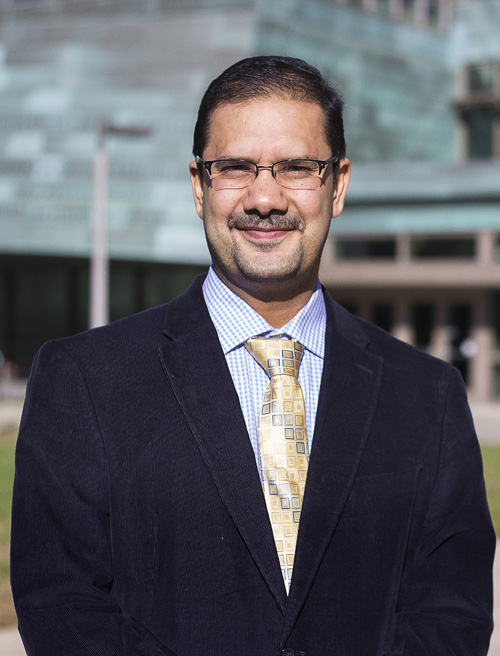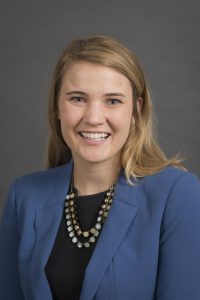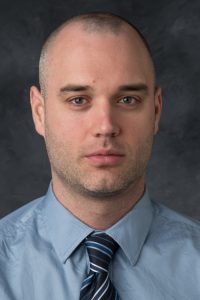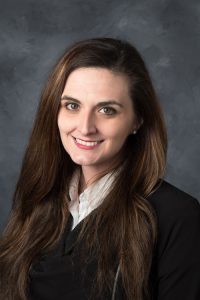Breadcrumb
CPH students featured in UI ‘Dare to Discover’ campaign
Published on February 1, 2018
University of Iowa students spend a lot of time hitting the books, sitting in lectures, and writing papers, but in between many are also helping to answer some of life’s most important and interesting questions as researchers and scholars.
To shine a light on their work, the UI Office of the Vice President for Research and Economic Development (OVPR&ED) is featuring 64 students in this year’s Dare to Discover banner series. The black-and-gold banners will be installed in early February throughout downtown Iowa City, and in the Old Capitol Mall/University Capitol Centre (UCC). They’ll remain up about six weeks before being installed throughout the Old Capitol Mall at least through the end of the spring semester. (Read more about the banner campaign.)
Here are the College of Public Health students and recent grads highlighted:
 Ali Al-Jumaili, PhD/MPH graduate, Pharmaceutical Socioeconomics
Ali Al-Jumaili, PhD/MPH graduate, Pharmaceutical Socioeconomics
- What is your area of research or scholarship? My research focuses on adverse drug events and improving work system in nursing homes.
- In simple terms, why does this research matter? Here in the U.S., nursing homes take care of 1.4 million people who cannot be cared for at homes any longer. My work helps enhancing medication safety and quality of life of nursing homes residents.
- What is your degree program and expected graduate date? Ph.D. in Pharmaceutical Socioeconomics and graduating on December 15, 2017
- Hometown: Baghdad, Iraq
- Faculty mentor/advisor: Prof. William Doucette
- What are your career goals? My graduate experience taught me how the integration of health-related research and pharmacy practice can enhance patient health and that strive me to teach pharmacy students and conduct research in this vital field.
Morgan Bobb, MD/PhD student, Epidemiology

- What is your area of research or scholarship? I use trauma data in the State of Iowa to understand when ambulances are used and who is more likely to use ambulances. Specifically, I study ambulance usage for pediatric injuries, particularly in rural communities. Ultimately, I seek to understand how parents’ decisions about ambulance usage contributes to access to high quality emergency care and clinical outcomes.
- Why does this research matter? By understanding how pediatric patients access the trauma system, we can work within healthcare and communities to provide better care for injured children.
- Degree Program: MD/PhD (Epidemiology) Candidate
- Hometown: Denmark, Iowa
- Faculty Mentors: Nicholas Mohr, MD, MS and James Torner, PhD
- Career Goals: My long-term goal is to improve rural healthcare delivery as a physician scientist in academic medicine.
 Brandon Butcher, PhD student, Biostatistics
Brandon Butcher, PhD student, Biostatistics
- What is your area of research or scholarship? My area of research is biostatistics where I develop and apply statistical methodology with applications in public health, injury prevention, cancer genetics, and biomedical imaging.
- In simple terms, why does this research matter? This research matters since the appropriate application of biostatistics in these area is able to infer meaningful insight about the underlying phenomenon, which can be used to inform interventions and policies to improve people’s lives.
- What is your degree program and expected graduate date? Ph.D. program in Biostatistics,
- Expected graduation: May 2019.
- Hometown: Belmond, IA.
- Faculty mentor/advisor: Brian J. Smith.
- What are your career goals? My career goals are to develop and apply biostatistical methods and software for real-world applications that can have a direct, positive impact on people’s lives.
 Kayla Faust, PhD student, Occupational and Environmental Health
Kayla Faust, PhD student, Occupational and Environmental Health
- What is your area of research or scholarship? The purpose of my dissertation research is to examine driving performance using a new, PC-based tractor driving simulator among farmers.
- In simple terms, why does this research matter? Among all the occupational industries in the U.S., the agricultural industry has the highest rate of fatal and nonfatal injuries. Because a majority of these are due to driving related incidents, it is important to understand the factors that contribute to crash risks among farm equipment operators, which can also have important implications for driver safety in general since many tractor-involved crashes occur on public roadways and have severe outcomes.
- What is your degree program and expected graduate date? PhD in Occupational and Environmental Health with a focus on Occupational Injury Prevention.
- Expected graduation date: Spring 2019
- Hometown: Manchester, Iowa
- Faculty mentor/advisor: Carri Casteel
- What are your career goals? I am seeking a career where I can comprehensively address traffic and farming safety problems from exposure assessments to the development and evaluation of interventions.
 Winnie Uluocha, dual program student: JD and Masters of Health Administration
Winnie Uluocha, dual program student: JD and Masters of Health Administration
- What is your area of research or scholarship? Understanding implicit bias and its implications in the criminal justice and public health systems.
- In simple terms, why does this research matter? Implicit bias research exposes the unconscious cognition, attitudes, and behaviors that contribute to societal disparities. Awareness of implicit biases coupled with proactive responses allow these systems to function more equitably.
- What is your degree program and expected graduate date? Dual-degree – Juris Doctor and Master of Health Administration, 2019
- Hometown: Chicago, IL
- Faculty mentor/advisor: Dr. Brian Farrell – Law School
- What are your career goals? To judiciously counsel health care providers on a wide array of regulatory and transactional issues.